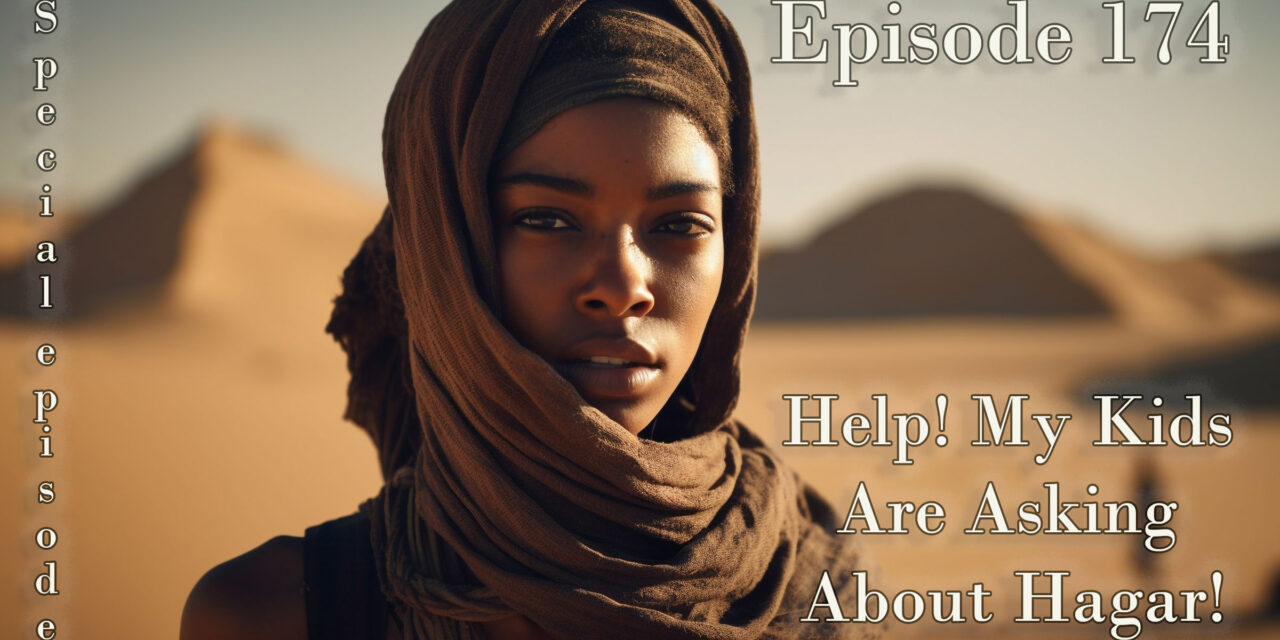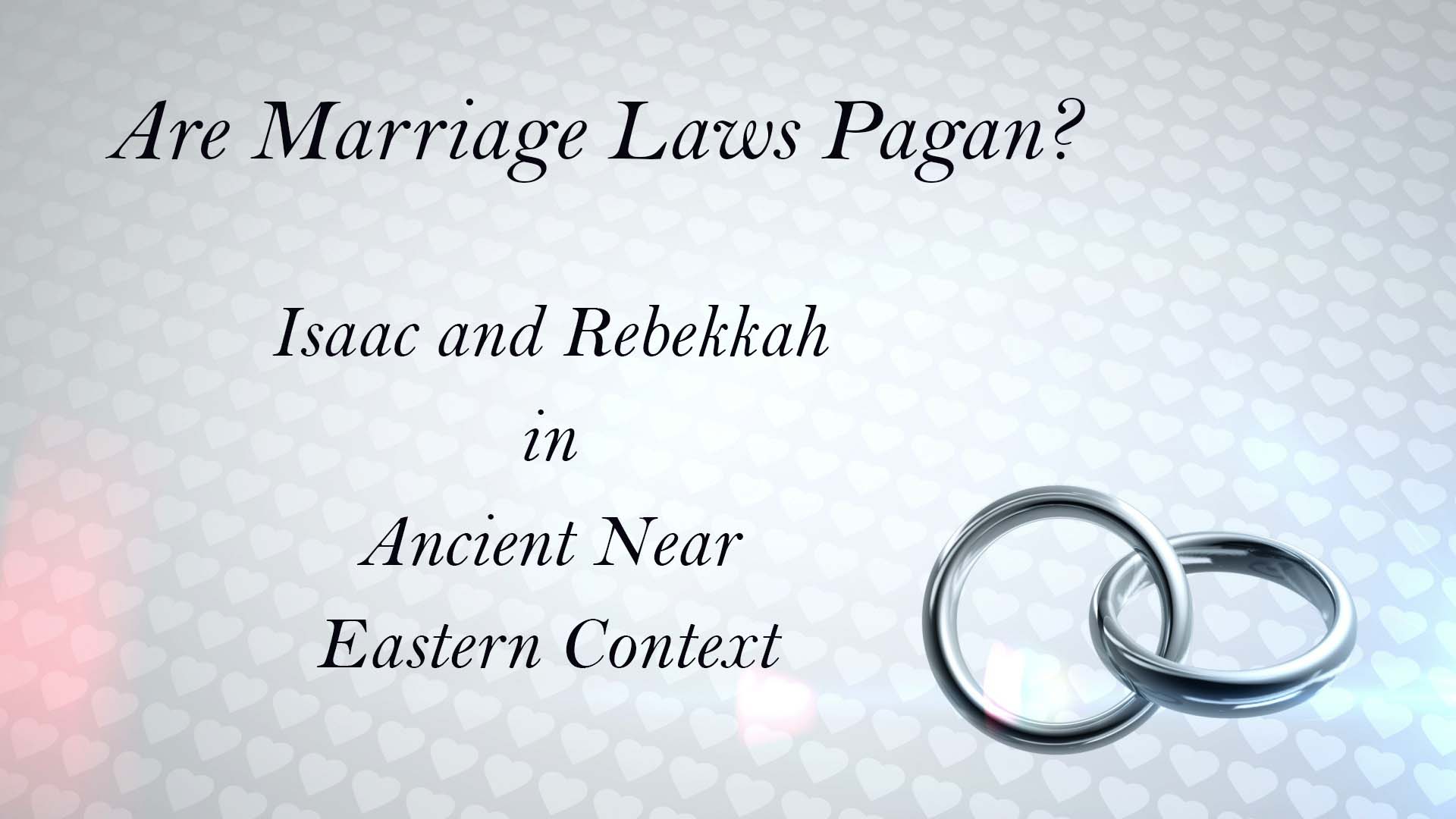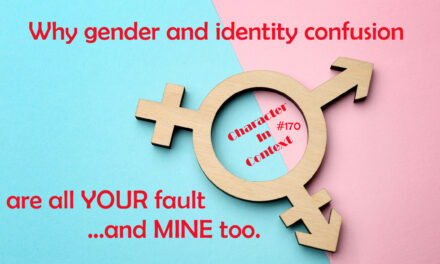I have actually been dreading this moment since I began the Context for Kids radio show and knew that one day, I would have to cover the Biblical account of Abram and Sarai’s use of Hagar to produce a child. In context, it’s an ugly tale, albeit a common one in the ancient world. I can’t be as blunt about the situation with the kids as I can be with adults and so I am devoting a program over on this side of my ministry with the hopes of helping adults know how to teach children about what is going on in this chapter from beginning to end. As these sorts of accounts are often used in the cultish justification of sexual abuses in the Church, kids really do need to have a decent working knowledge that this sort of situation isn’t okay.
(My affiliate links for Amazon products are included in the post. As an Amazon Associate, I earn from qualifying purchases.)
If you want to watch me recording a slightly longer version of this live on YouTube, check this out! If you can’t see the podcast player, click here.
Hey there, and now for something completely different. When I began teaching the kids Genesis in October 2020, I knew the day would come when I would have to decide how to handle some truly risque and even horrifying sexual material with the kids. Since I don’t really look good in an ankle bracelet, my solution is to teach parents the background material, which will allow me to be deliberate and cautious with how I handle the material for kids–skipping over what I need to skip over. I wrote a book called Context for Adults: Sexuality, Social Identity and Kinship Relations in the Bible (affiliate link) where I covered this sort of material for the sake of parents hopefully being able to answer the hard questions as they came up. The situation between Abram, Sarai, and Hagar is more complex than it first appears. And yet, it is also important to address this text from a modern standpoint because passages like this one and others are often used to groom little girls into believing that certain activities and relationships are okayed by God just because they involved a patriarch in the Bible.
In Utah recently, just south of where I live, they banned a ton of books from school libraries because of sexual content, and the day they passed the bill, I knew the Bible would be on the list and that no one would be able to argue (based on the often disturbing sexual content) that there should be an exception and—wouldn’t you know it, that’s exactly what is happening. The Bible talks about incest, sexual slavery, wartime rape, seduction, gang rapes (both hetero and homosexual), older men marrying young girls, concubinage, bestiality, and ritual prostitution. And this content has been used historically to groom children (boys and girls both) when presented outside of the historical context. That’s not okay with me. Parents and other caregivers need to be able to teach kids about the ugly bits in ways that won’t scar them for life and so that the material cannot be used against them. We will have another one of these episodes when the kids and I reach the destruction of Sodom and Gomorrah and the other cities of the plain and again with Lot and his daughters.
Hi, I am Tyler Dawn Rosenquist, and welcome to Character in Context, where I teach the historical and ancient sociological context of Scripture with an eye to developing the character of the Messiah. If you prefer written material, I have years’ worth of blogs and transcripts at theancientbridge.com as well as my six books available on Amazon—including a four-volume curriculum series dedicated to teaching Scriptural context in a way that even kids can understand it, called Context for Kids—(affiliate link) and I have two video channels on YouTube with free Bible teachings for both adults and kids. You can find the link for those on my website. Past broadcasts of this program can be found at characterincontext.podbean.com, and transcripts can be had for most broadcasts at theancientbridge.com. If you have kids, I also have a weekly broadcast where I teach them Bible context in a way that shows them why they can trust God and how He wants to have a relationship with them through the Messiah. All Scripture this week comes courtesy of the CSB, the Christian Standard Bible, but you can follow along with whatever Bible you want.
Okay, so in Genesis 15, God promises Abram a baby but gives no information on how that baby is going to happen. Sarai isn’t mentioned at all. One of the things I will be stressing with the kids is that God often gives promises without a lot of information in order to test us to see if we will wait on Him, and this right here is ground zero for that in the Bible. According to ancient Near Eastern law, we have a couple of traditions that were in play at this time. First, Abram had the right to send Sarai away and get another wife because producing an heir wasn’t just a nice bonus to a relationship but a matter of life and death. People needed to be cared for in their old age, and that duty fell to the firstborn son and his wife. Isn’t it interesting now that the job almost always falls to daughters? Something to think about. But I digress. Abram could have divorced Sarai, and no one in the outside world would have had anything negative to say about it. However, with Abram and Sarai there is a unique wrinkle in that the marriage is an endogamous one (meaning within the clan) and more specifically, within the immediate family as they were half-siblings. Divorcing your half-sister for anything less than gross immorality was going to be messy, even if she wasn’t producing an heir.
As far as the reproductive beliefs of the time, the baby itself was believed to be exclusively the fruit of the man. A man deposited seed within the woman, and that seed was a miniature baby. The woman was considered to be the field to plant that seed in, or in modern-day language we could call her job that of an incubator. A fertile field would produce babies, and a barren field would not—and that’s exactly how we got that sort of language, as a carry-over from the time before we knew about eggs and sperm. Or that men could have reproductive issues! Until the end of the 17th century, people had no idea the science behind reproduction, and the language of the Bible reflects not poetic ideas but their real beliefs. God used that same language to communicate with them. When the Bible says that Sarai was barren, it means that in the eyes of the world, she was a lifeless field. Being barren myself, I can assure you these ideas are still out there. Henry VIII never thought he was part of the problem and that it was his swimmies producing girls instead of boys. Instead, he believed that his wives’ wombs were incapable of producing boys out of the seed he was giving them. And it might sound odd, but this was actually based upon what they could observe from agriculture.
So, although Abram had the right to an heir—so did Sarai. Sarai could use precedent from other ancient Near Eastern societies to force her husband to take a servant as a concubine. This was Sarai’s right in that world, and it protected women from divorce. A concubine wasn’t a full wife. At most, she might become a lesser wife, but mainly she was a babymaker. As a servant enslaved to Sarai, Hagar had no ownership over her own body and no right to say no. For that matter, neither did Bilhah or Zilpah later on in Genesis. According to the law/precedents/wisdom codes of other nations in that area, the child birthed to Hagar would belong to Sarai, and Sarai would name the child. Sarai would be vindicated through the birth of this child and would be seen as a mother, fulfilling her social role as a mother and a wife. The pressure on Sarai to provide an heir was beyond anything we can probably imagine. I know the pressures to have a baby and especially in the church community where everything revolves around families and barren women are often treated as sinners or cursed—as though wombs are magic fairy boxes instead of complex organs that can be malfunctioning and damaged just like a heart or spleen. Sarah was now in her 70s, and the time had come and gone with nothing to show for it. Even the serving girls with babies would see themselves as greater than Sarai in terms of fulfilling their community roles.
Abram and Sarai lived within what we would call a dyadic social community. They were not individuals the way we are. They couldn’t define themselves apart from the community and vice versa. The way they saw themselves was directly tied to the way the rest of the community viewed them. No one had independent thoughts about themselves that would deviate from how others defined them. And so the Bible says that “Sarai was barren.” That is the only way we ever see her defined because in failing to be able to produce a child, she was not even meeting the minimum standards of what it meant to be a woman within their community. That’s who women were—they were human beings who married and had children. Nowadays, you can look at me and barrenness won’t be the first thing you would think about me. You might take notice of my appearance, my lack of fashion sense, my role as a Bible teacher, or my education as a scientist. You would judge me largely by how I treat you. That wasn’t Abram and Sarai’s world at all. They would have felt shame at having no children but especially Sarai. She was seen as a failure, and people would call Abram crazy for not taking another wife—sister or not. Dyadic social communities operate through very severe forms of peer pressure. Think about being in high school. Forever.
And so chapter 16 opens with Sarai asserting her rights to Abram and over Hagar by presenting her as a “woman” to her husband, an “isha.” I want you to notice that never once in this entire chapter do either Sarai or Abram ever refer to Hagar by her name. In fact, we only know her name because the narrator tells us and, in verse eight, the Angel of the Lord calls her by name. Although Hagar is used and treated as subhuman, and she certainly had no control over her life, God identified her by name first and only then by her community role. But I am getting ahead of myself. Hagar is forced to have sexual relations with an eighty-five-year-old man until she becomes pregnant–although she wouldn’t have even considered resisting. She was likely very young when she was given to Sarai in Egypt (presumably by Pharaoh) and would have been a virgin. How would she have looked at this? Well, we can only guess. Potentially bearing the heir to the clan would definitely be a positive for her and would set her in the clan’s estimation above Sarai, who couldn’t have babies. Conceivably, Hagar would have seen this as a promotion since she had never had control over her own body before this and, in fact, women’s bodies in those days belonged to any number of males and not to themselves—either a father, uncle, brother, husband or master. There were no laws in place to protect slaves, much less female slaves. To be used in this way was expected, and it was a given. Hagar couldn’t have said no and likely was making the best of a situation she could never have prevented.
Today, we rightly look at a situation like this and say, “She was raped,” because there can be no idea of consent when one person owns another, and to run away would place Hagar in terrible danger from the elements, wild beasts, and people alike. Abram and Sarai had complete power over her, and she would have accepted that as part of her life and her expected position within the household. She would have seen the benefits of this arrangement, certainly, but that isn’t the same as to claim it made her happy. Enslaved people have always had to be pragmatists—which means that they found wisdom in seeing their situations for exactly what they were and did what they had to do to get along and stay alive. Enslavement was normal until just a few hundred years ago. For one person to have absolute power over another person was normal. For women to be beneath notice by both men and other women was normal. It is this which makes God’s treatment of Hagar so astonishing and a wonderful lesson for us all.
Once Hagar became pregnant, there would have been celebration and rejoicing, and Hagar would have become quite the celebrity in the camp. This, despite the fact that infant mortality was shockingly high and children often weren’t even named until they were weaned. As an example, I once ran an internet infertility group, and there were women in them who named every single child they lost through miscarriage, and it didn’t take me more than a year to figure out that if I kept naming my babies, I would run out of names pretty quickly. This is something seen a lot in ancient societies, and it is why we see a huge celebration at the weaning of Isaac because it meant that he was now “viable” and likely to survive. Until then, everyone was holding their breath. In addition, Sarai didn’t feel as though she could move to expel Ishmael until Isaac had reached that point of survivability. But, back to Hagar’s pregnancy. Hagar begins to despise Sarai as her abdomen swells. Hagar was young, and Sarai was seventy-five years old. Sarai can feel herself being eclipsed in the eyes of the household by Hagar, and Hagar can feel it too. It was likely the first time in Hagar’s life that she felt important, and the eyes and hopes of everyone rested on the baby she carried. If it was a boy, then they were saved and secure, and if it was a girl, Abram would return to her again for another baby. Either way, she would be giving birth to the savior of the clan, her son would be a rich man, and she would be the natural mother of a rich man.
It gets so frustrating for Sarai that she goes to Abram and blames him for the entire problem with Hagar. Is she wrong or right? In a community like this, it was up to the patriarch (the male in charge) to make sure that everyone was in their place and that their roles were clearly spelled out so that there was no confusion. Sarai was complaining that Hagar didn’t know who she was anymore, and she was behaving above her station. She wasn’t acting like a submissive slave anymore, and that really chaps Sarai’s hide something fierce. Hagar was behaving like the matriarch of the clan (the highest ranking woman) instead of the servant girl to the matriarch. This was a big crisis which could tear apart the entire household if Abram was allowing this to happen without correction—something that only he could accomplish. After all, Hagar was carrying Abram’s child, and Sarai couldn’t move against her without permission from the child’s father. Abram hears Sarai’s concerns, agrees with her, and gives her carte blanche to treat Hagar however she wants to bring Hagar back in line. And you know what? This is a horrifying mess because Abram didn’t take care of this himself—instead, he sent the angriest person in the camp to handle it. Sarai was humiliated, infuriated, confused about her standing, and undoubtedly jealous. And now she had been given permission to do whatever was in her heart to do. Would she treat Hagar (whose name she never even uses) with understanding, seeing that she is a young and confused girl having a baby she never asked to have in the first place with an old man? Would Sarai treat her wisely, as someone who would be adopting this child once it was weaned? Sarai had wanted to be “built up” through Hagar’s womb, but something happened and all that changed. Sarai never considers Ishmael to be her child, never protects him, and never loves him. In fact, once Abram tells her to deal with it however she wants, she beats Hagar so badly that Hagar runs away into the wilderness.
In the wilderness, the Angel of the Lord comes to her and calls out to her by name. Sarai never called her by name, and neither did Abram in this story. But God sees something more than Abram and Sarai see. God sees a human being who is first Hagar, an individual, before calling her by her community identity as Sarai’s slave. He asks Hagar where she has come from and what she is doing, and Hagar tells him that she is running away from her mistress, Sarai. Likely, the Angel of the Lord disappoints her when he tells her to go back and submit to Sarai—and I imagine this means not so much to submit to abuse but to humble herself to the point where Sarai no longer feels threatened and humiliated. And this is the point where something extraordinary happens. God blesses Hagar in much the same way He blessed Abram.
He says, “I will greatly multiply your offspring, and they will be too many to count.” which sounds almost exactly like Gen 15:5. In other words, Yahweh will make Hagar into a great nation. Then, He said, “You have conceived and will have a son. You will name him Ishmael, for the Lord has heard your cry of affliction.” Ishmael means “God hears,” and this is the first of a great many references to Yahweh hearing the cry of the afflicted, oppressed, and suffering. In fact, it is a common theme running all the way from Genesis through Revelation. Kings in the ancient Near East wanted to be remembered as righteous and just, and that required doing certain things on behalf of those who were being treated poorly. Notice that it is Hagar who will name the child Ishmael and not Sarai. When we get to the births of the sons of Bilhah and Zilpah, we will see that those children are named by Rachel and Leah. But Sarai will have no part in the naming of Ishmael, despite it being her right by ancient custom. The Angel further says, “This man will be like a wild donkey. His hand will be against everyone, and everyone’s hand will be against him; he will settle near all his relatives.” This sounds like an insult, but it really isn’t. It does mean that Ishmael will not be living the life expected of a son of Abram. Wild donkeys live out in the wilderness, away from civilization, and he is portrayed as someone who will be a thorn in everyone’s side and difficult to live around (especially since he will never be that far away). Ishmael is going to be an ever-present reminder to Abram and Sarai about what they did as well as to Isaac once he grows up. Ishmael is going to be his own man, living life on his own terms. Ishmael, most importantly, will be a free man and powerful, not a slave, which bodes well for Hagar too.
And now we get to something unique in the Bible—Hagar is the only human to name Yahweh, calling Him El-Roi, which means ‘God sees me.’ She said, “In this place, have I actually seen the one who sees me?” And so the well is named B’er lachai ro’I, which means the Well of the Living One who sees me. Hagar got up and went back and had her baby, and Abram named him Ishmael—which means that Abram claimed Ishmael as his own even though Sarai was clearly not wanting to be involved anymore. As the chapter ends, Abram is eighty-six, and Sarai is seventy-six.
Now, about ten years before I became a believer, there was a movie called The Handmaid’s Tale based on a book, which was based rather loosely upon what happened with Abram, Sarai, and Hagar. In fact, that was my first exposure to this account, and it was downright horrific. But I also think the way we read this account in the church is way too clinical and unrealistic. These were three real people in a terrible situation that only got worse. I believe that if we don’t engage emotionally with the story, we come away with shallow understandings that are just way too easy to be useful or challenging. In chapter 15, Abram is told that his descendants will be enslaved and treated very badly. This gave him a heads-up how to perhaps look at his own slaves and treat them better than he otherwise would. But that didn’t happen—there was obviously some sort of disconnect between the idea of his descendants being slaves and the people he owned. That’s the sort of thinking we can never afford to engage in. Someone who is enslaved, oppressed, and/or suffering has to be every bit as human to us as our own family. Otherwise, we can always justify whatever evils we wish to act upon them. We either humanize people or dehumanize people.
So, yesterday (when I am writing this), they began to find the sub wreckage from that Titanic expedition, and yeah, what they did was foolhardy, but the comments I see out there are disturbing in the extreme. No matter what we think of their decision, they have loved ones who are still alive, hurting, and they really don’t need to see jokes about how they ended up just like the people who died on the Titanic. In the same way, Hagar has to be every bit as real and precious to us as Abram and Sarai. When we read this account with them as the heroes, we are going to whitewash some pretty dastardly behavior on the part of two elderly people against someone who was likely little more than a child. And when we make excuses for them (when the Bible makes no excuses for their behavior), we are teaching our kids that if you are a believer or someone powerful and “important” in the Kingdom, then there are different rules for how we can treat people. When we look at what happened with Hillsong, Mars-Hill, Bill Gothard, Jonestown, and too many others, we can see that this mindset is destroying the most vulnerable among us–especially women and young girls but also young boys.
Abram and Sarai’s behavior in Gen 16 wasn’t godly—it was 100% ancient Near Eastern. They did nothing that the Hittites, Babylonians, Assyrians, or Canaanites wouldn’t have done before or after. Yes, they should have waited on God, and that’s the easy takeaway, but there’s more to it than that. They should have called Hagar by her name, and they should have treated her like the Angel of the Lord treated her. Yes, she foolishly treated Sarai badly, but we would do well to remember that she was very young and had never had an ounce of power or honor in her life; it clearly went to her head. The Angel of the Lord came to her as one who was in need of an ezer, a helper. He hears her. He sees her. He makes her promises. He gives her hope and a future. Abram and Sarai were using her to produce an heir while God was making a way for her to be vindicated as the mother of a multitude.






















Ta, Tyler, I was taught many years ago that “women don’t have seed” and that’s why the messianic prophesy to Eve was such a deal,,,, we were taught that as now=a=days science, rather than sperm as agricultural-style seed. Way cool!
And, yeah, never looked at it as Abram and Sarai USING Hagar in such nasty fashion.
Hagar was Egyptian; Egyptians were not and are not Black, so please stop spreading this misinformation through pictures like the one posted. Thanks!
You are incorrect. Egypt was a melting pot of many ethnicities. Some were black, others were brown and they were all joined by the common Egyptian culture. I am sick and tired of representing Biblical figures as though they were white. It was a good pic and I used it. They are not black now, but brown. However, during that time they were a bit of everything. As Hagar was a slave, she might well have been an Ethiopian or Sudanese. We just have no idea.